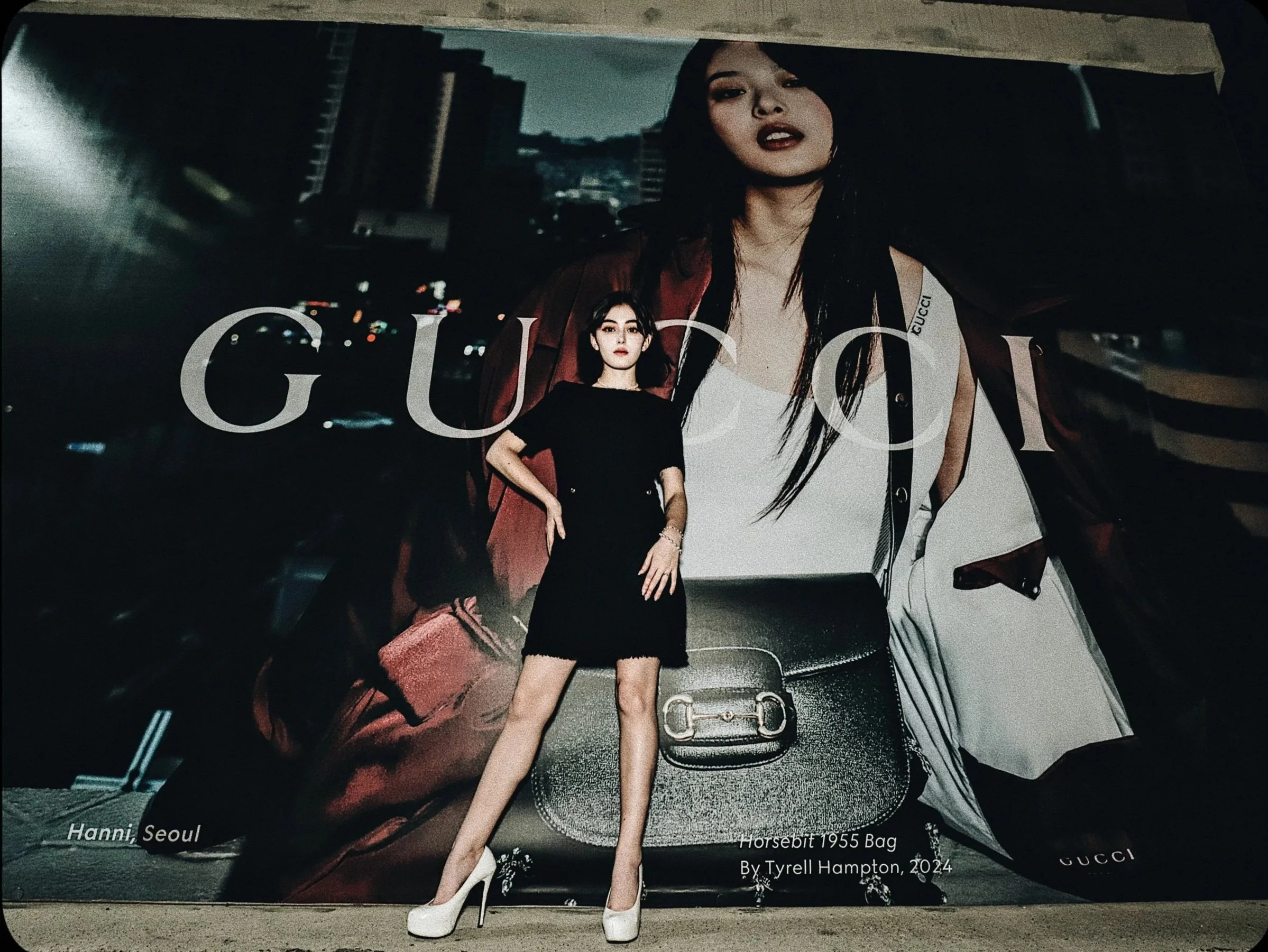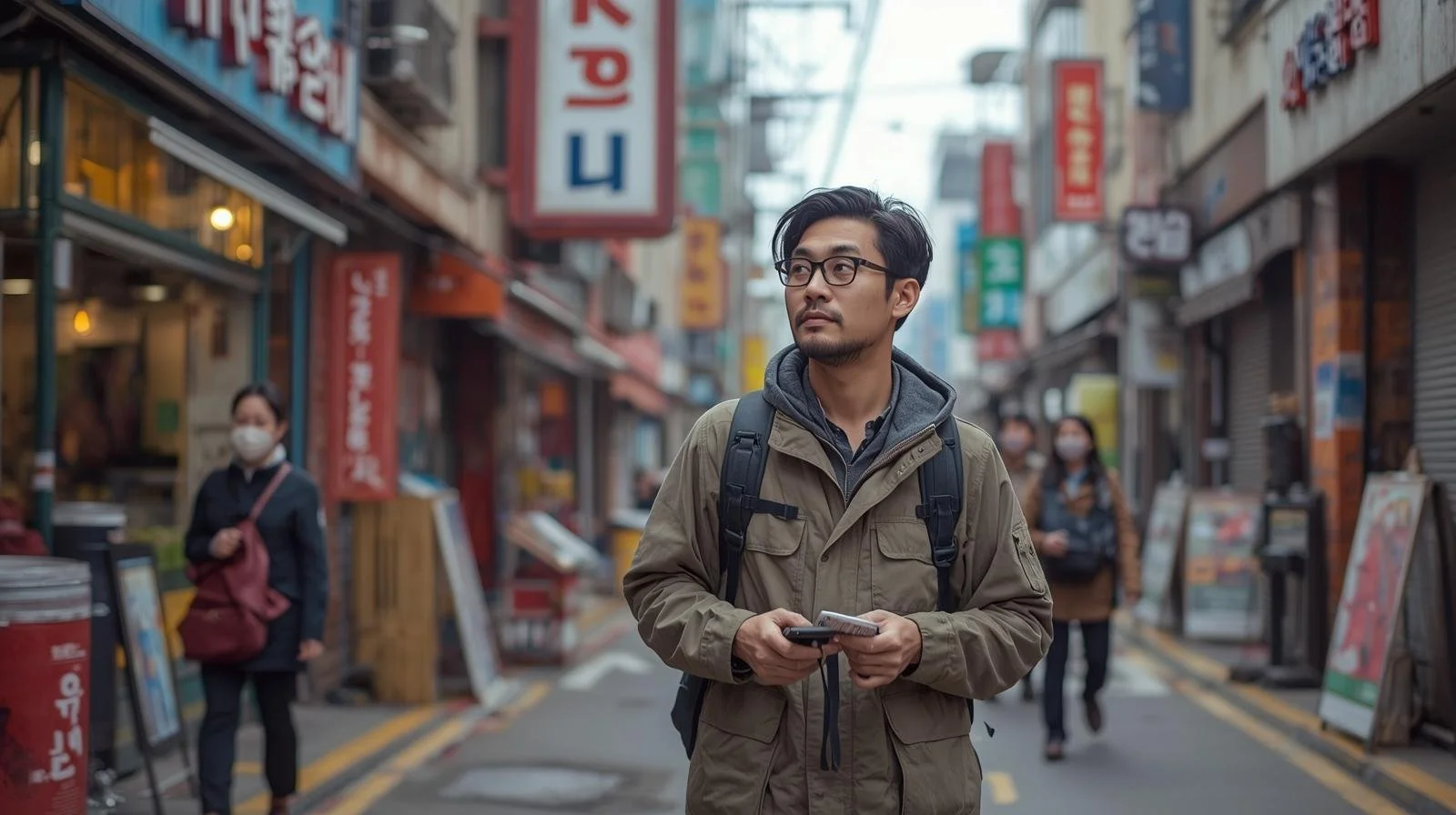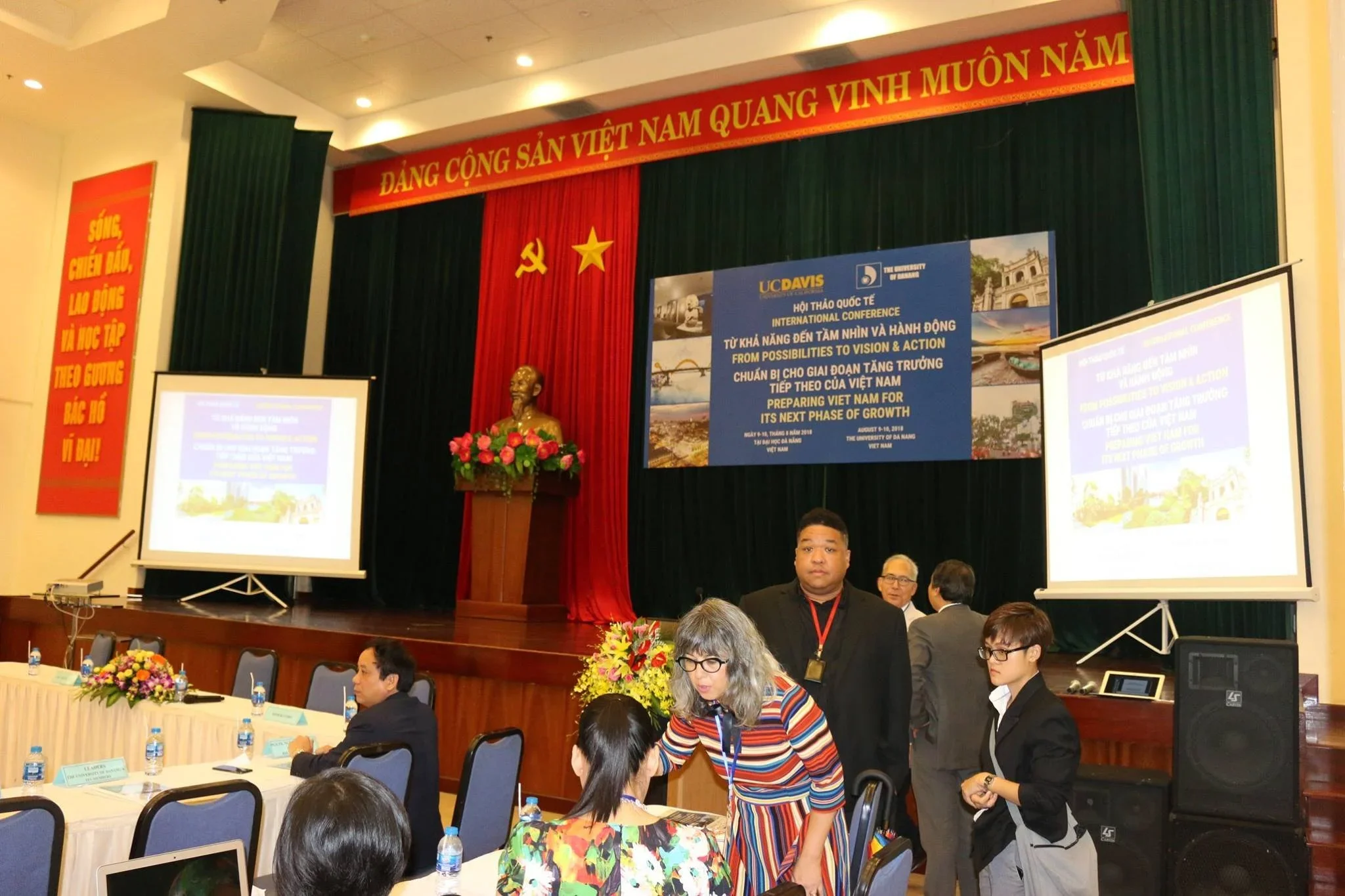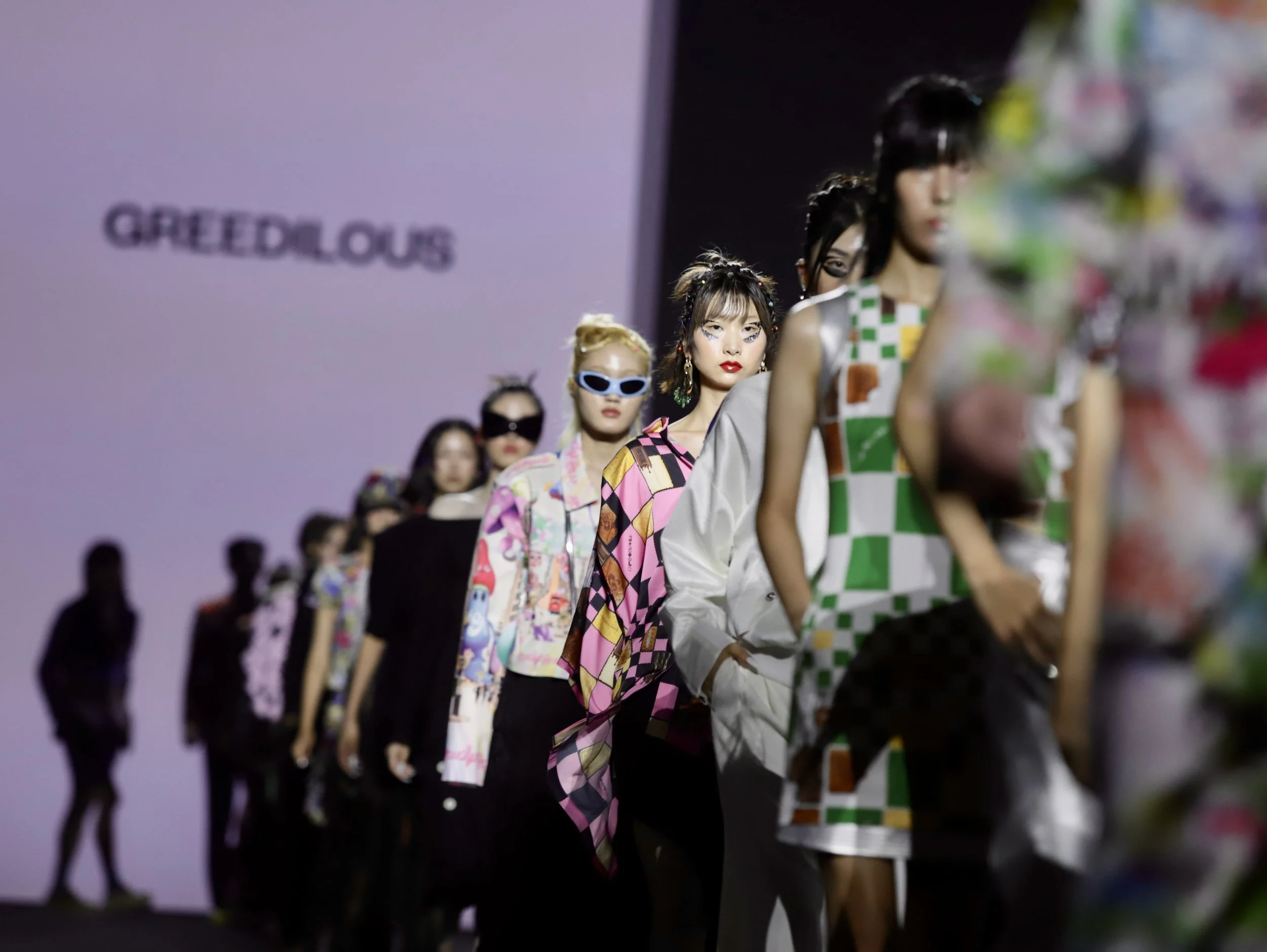Korea, Globally understood.
-
Summer Course: "Korea Beyond K-Pop"
Designed for late high school/early undergraduate students.
(4 weeks, June-July)
The flagship KARSI experience that moves beyond surface consumption to embodied cultural knowledge through integrated research methodologies. Students progress from direct urban engagement through industry immersion to sophisticated critical analysis, culminating in original research production. Led by our core faculty team including Dr. Michael Hurt, Dr. Donna Lee Kwon (pending), and CedarBough Saeji (pending), with an exclusive industry partnership providing unprecedented access to K-pop production processes.The flagship KARSI experience that transforms students from cultural consumers into skilled researchers through hands-on methodological training in Seoul. Students progress through four distinct phases—direct urban engagement, authentic industry immersion, sophisticated critical analysis, and original research production—developing concrete skills in ethnographic fieldwork, visual sociology, performance analysis, and academic writing. Led by our core faculty team including Dr. Michael Hurt, Dr. Donna Lee Kwon (pending), and CedarBough Saeji (pending), with an exclusive industry partnership providing unprecedented access to K-pop production processes through Five Stones Entertainment.
Week 1: Embodied Urban Research - Dr. Hurt's "City as Text" methodology takes students through actual movement across Seoul neighborhoods, where they learn to conduct structured ethnographic walking protocols, photograph urban scenes using visual sociology techniques (capturing street-level documentation, architectural details, and spatial flows), and create detailed field notes documenting observations, sounds, interactions, and sensory experiences. Students navigate areas like Gangnam, Hongdae, and Euljiro on foot, conducting impromptu field interviews with Seoul residents and mapping spatial patterns to understand how different demographics use public spaces throughout the day. This week develops core skills in participant observation, field note methodology, real-time documentation practices, spatial analysis and urban mapping, reading architectural and commercial landscapes as cultural texts, and ethical research practices with human subjects in public spaces. Students learn to treat urban spaces as living research sites rather than tourist destinations, building the foundation for all subsequent research work.
Week 2: Embodied Cultural Production - Dr. Kwon's "madang" methodology exploring embodied spatial participation, combined with full industry immersion through Five Stones Entertainment, provides students with authentic trainee experience that moves far beyond observation to direct physical and emotional engagement. Students follow actual daily trainee schedules including morning calisthenics and cardiovascular exercise routines (modified for individual fitness levels), learn and execute choreography for a K-pop song under professional instruction, and undergo professional styling sessions covering makeup application, hair styling, and wardrobe selection. The week includes participation in professional photo shoots (headshots, concept photos, album cover-style shoots), attendance and contribution to production planning meetings, rehearsal of performance elements with feedback from industry professionals, and observation of recording sessions and production processes. This truly embodied approach develops skills in performance ethnography and embodied research methods, physical literacy in K-pop performance vocabulary, understanding entertainment industry labor practices through direct experience, cultural production analysis from an insider perspective, documentation of embodied experiences for academic analysis, interview techniques with industry professionals, and critical awareness of the physical and emotional demands in cultural industries.
Track Selection Process: Students work with faculty in one-on-one meetings to discuss their Week 1-2 experiences and observations, reviewing field notes, photographs, and personal reflections to identify emerging patterns and research interests. Through this guided process, students draft preliminary research questions based on what most engaged them, then choose specializations from four research focus areas that will guide their Week 4 research products: Performance & Space (how embodied practices create and transform cultural spaces), Industry & Labor (production processes, working conditions, and entertainment labor), Urban & Visual (Seoul's built environment and visual culture), or Transnational Flows (how Korean cultural products move, adapt, and transform globally). Students begin developing detailed research plans that will structure their final project work.
Week 3: Embodied Critical Analysis - CedarBough Saeji guides students in revisiting their Week 1-2 experiences through sophisticated theoretical frameworks including cultural studies, performance theory, and labor studies, helping them develop analytical approaches that connect personal experience to broader scholarly conversations. Students conduct focused research using library databases and Korean-language sources, workshop their research questions and methodologies with peers, and present preliminary findings to receive feedback from faculty and classmates. This week develops crucial skills in applying theoretical frameworks to ethnographic data, conducting scholarly literature reviews in Korean Studies, employing critical analysis methods that bridge experience and theory, constructing academic arguments with evidence-based reasoning, presenting to academic audiences, providing and receiving constructive peer feedback, and synthesizing embodied knowledge with scholarly discourse. Students learn to move from personal experience to scholarly insight, transforming their immersive experiences into rigorous academic analysis.
Week 4: Research Synthesis & Production - Students work within their selected research focus areas to analyze collected data (field notes, photographs, interview transcripts, embodied experiences) and produce either a 15-20 page research paper or an equivalent multimedia research project. They create formal academic presentations (20 minutes) of their findings, design supporting visual materials (data visualizations, photo essays, or multimedia presentations), and present their final research to peers, faculty, and invited guests while participating in peer presentations and providing scholarly feedback. Students complete portfolio documentation of their entire research process, developing skills in academic writing following Korean Studies conventions, qualitative and visual data analysis and interpretation, research presentation design and delivery, creating scholarly arguments supported by ethnographic evidence, multimodal research communication (written, visual, oral), time management and project completion under deadlines, and professional academic presentation. The final products demonstrate students' ability to synthesize embodied learning into original research while maintaining the holistic foundation from Weeks 1-3, creating customized scholarly contributions that advance understanding of contemporary Korean culture beyond surface-level consumption.
-

The City as Text
Designed for late high school/early undergraduate students, and can be theoretically dialed up for graduate students.
(16-week/semester course)
Comprehensive ethnographic training centered on urban interfaces theory—the understanding that cities are shaped by dynamic boundary zones where different urban systems, economies, and aesthetics intersect. Based on Dr. Hurt's experience teaching inside Syracuse University's prestigious Three Cities Asia program—previously co-taught at Yonsei University and Syracuse University, now co-hosted with the University of Seoul—this semester-long program trains students to identify and analyze urban interfaces as the fundamental organizing principle of contemporary urbanism. Students learn to "read" Seoul's urban spaces by mapping how global capital flows, local cultural practices, digital technologies, and aesthetic trends converge at specific spatial sites. The program develops professional ethnographic skills through sustained practice and faculty supervision, designed for Korean contexts where compressed modernization makes interface dynamics particularly visible.
Students employ a range of ethnographic survey practices including interviews, site mapping, participant observation, and visual documentation techniques to understand how urban interfaces shape everyday life and cultural production. Advanced students may also work with photo-sartorial elicitation methodology—a specialized visual sociology technique that captures embodied cultural knowledge through spatial performance—to document how urban space structures aesthetic expression. This reveals Seoul's global influence not as abstract "soft power" but as concrete spatial innovation: Seoul has pioneered interface types including nth spaces (user-activated social spaces for digital content production), parametric spaces (Instagram-optimized environments), and industrial-aesthetic transitions (post-industrial zones transformed into creative districts) that subsequently reshape urban experience across Asia and globally.
Weeks 1-4: Theoretical Foundations & Methodology Training - Students engage with assemblage theory, actor-network approaches, and hyperobjects philosophy to understand how global forces manifest through local urban configurations. The theoretical training introduces strategies and tactics in urban environments, how cities function as assemblages of provisional socio-spatial relations, how vast phenomena like gentrification become visible at the neighborhood scale, and frameworks for analyzing urban interfaces as active zones of mediation. Methodological training focuses on core ethnographic survey practices including participant observation, field note documentation, semi-structured interviewing techniques, site mapping, and visual documentation using street-level photography. Students also learn specialized techniques such as photo-sartorial elicitation for advanced projects. Students practice treating their own movement through urban space as ethnographic data, documenting urban navigation, neighborhood transitions, and how psychological boundaries define city districts.
Weeks 5-12: Extensive Fieldwork Across Seoul Neighborhoods - Students conduct systematic fieldwork across five distinctive Seoul neighborhoods selected to represent different urban interface typologies. In Apgujeong, students analyze Seoul's most exclusive district as a case study in compressed modernization, examining how global luxury capital intersects with Korean consumer culture and the emergence of "Rodeo Street." In Euljiro, students explore Seoul's industrial heritage district, analyzing narrow alley systems where traditional dabangs coexist with contemporary cafes, documenting the district's function as a temporal interface transforming from industrial activities during the day to entertainment uses at night. In Yeonnam-dong, students examine a former residential area transformed by proximity to Gyeongui Forest Park, investigating Instagram-optimized aesthetic choices and spatial affordances for self-documentation. In Dongdaemun, students analyze the intersection of 24-hour fashion markets, Zaha Hadid's DDP, and historical preservation, documenting interfaces between traditional commerce and global fashion networks. In Seongsu-dong, students investigate Seoul's most intensely gentrifying post-industrial neighborhood, analyzing the district's exceptional interface density—Seoul's "hottest" neighborhoods have 8-9 different interface types present simultaneously compared to 3-4 in emerging areas—documenting how this variety creates affordances for diverse performance styles.
Students employ core ethnographic methods across neighborhoods including structured ethnographic walking protocols, street-level photography following visual sociology techniques, impromptu field interviews with residents and business owners, site mapping documenting spatial patterns and how different demographics use public spaces, and detailed field notes recording observations, sensory experiences, and phenomenological reflections. Advanced projects may incorporate photo-sartorial elicitation methodology working with models to document how individuals perform differently across spatial configurations, generating research data about spatial-bodily relationships and embodied cultural knowledge.
Throughout the fieldwork phase, students learn to treat Seoul's subway and bus networks as both research tools and sites for understanding urban connectivity, experiencing how neighborhoods connect within the larger urban fabric and observing how spatial and social characteristics shift during transitions. Students develop sophisticated mental maps of Seoul's urban landscape while gaining confidence in navigating complex urban environments—skills that transfer to cities worldwide.
Weeks 13-16: Analysis, Digital Mapping Projects, and Final Urban Intervention Presentations - Students synthesize field observations, photographs, and interview transcripts into coherent research arguments employing multiple analytical frameworks. Working with professional architectural mapping techniques adapted from Syracuse University's Mapping Cities curriculum, students create layered systems analysis documenting multiple systems (capital flow, ecological patterns, local traditions, global cultural trends) interacting within urban spaces, spatial typology documentation, temporal transformation maps, interface identification and analysis, and collaborative drawings synthesizing multiple perspectives. Students develop digital portfolios combining written analysis with visual documentation, producing research papers (15-20 pages) that connect embodied fieldwork experiences to broader scholarly conversations in urban studies, Korean studies, and visual sociology.
The semester culminates in the design and execution of small-scale urban interventions—"Direct Action" (직접행동하기)—where students apply analytical insights to propose and sometimes implement temporary modifications to urban interfaces that make visible the hidden dynamics they have documented. Drawing inspiration from tactical urbanism and pop-up architecture theory, these interventions function as live experiments testing new connections between different urban systems, revealing underlying urban interfaces that were always present but invisible. Students present complete research portfolios including field documentation, analytical mapping projects, written arguments, and urban intervention proposals to peers, faculty, and invited guests from Seoul's urban planning and architecture communities, demonstrating their ability to conduct independent ethnographic fieldwork, analyze cultural phenomena through embodied experience and theoretical frameworks, and communicate research findings through written, visual, and oral formats that meet academic standards.
This comprehensive semester program prepares students for graduate-level research in urban studies, Korean studies, visual sociology, or architecture while providing transferable skills in ethnographic fieldwork, spatial analysis, visual documentation, and cross-cultural research. The course emphasizes screen-native research methodologies appropriate for studying contemporary digital culture, recognizing that Seoul's influence stems from concrete spatial innovations—nth spaces, parametric spaces, and industrial-aesthetic transitions—that enable new forms of cultural production and aesthetic performance that subsequently spread to Vietnamese cafés, Indonesian youth culture, and urban transformations globally. Students learn to conduct materialist spatial analysis that moves beyond "soft power" narratives to understand how Seoul exports interface typologies and spatial protocols that reshape urban experience across Asia and beyond.
-

Executive Education
Korean Cultural Intelligence for Executives.
(Five bespoke course modules offered in short bursts across 2-3 days at a time)
Program Overview: Five intensive modules designed to give executives sophisticated analytical frameworks for understanding Korean society, culture, and business dynamics. Rather than prescriptive "business culture" rules, participants develop the ability to read and navigate Korean contexts through direct observation and cultural analysis.
What We Don't Do: KARSI does not offer traditional "Korean business culture" programs filled with prescriptive rules, cultural etiquette lists, or superficial "do's and don'ts" guidance. We reject the listicle approach that treats culture as a collection of behavioral tips to memorize.
What We Do: We provide rigorous education in Korean history, sociology, anthropology, and cultural analysis. Our faculty are PhD-level researchers who teach executives to understand the deeper patterns, historical forces, and social dynamics that shape contemporary Korean behavior. Rather than telling you what Koreans do, we teach you why they do it and how to read cultural contexts yourself.
Our Methodology: Through ethnographic observation, historical analysis, and critical cultural theory — all grounded in case study reality — executives develop sophisticated analytical frameworks they can apply to any Korean business situation. We assume our participants are intelligent professionals who benefit more from understanding cultural logic than from memorizing cultural rules.
Operational Logic: Korean business success requires cultural intelligence, not cultural compliance. Executives who understand the historical, social, and psychological foundations of Korean culture make better strategic decisions, build stronger relationships, and navigate complex situations with confidence. Surface-level cultural training fails because it doesn't provide the analytical tools needed for real-world complexity.
Expected Outcome: Graduates possess the cultural literacy to read Korean social situations, predict market responses, understand organizational dynamics, and develop business strategies that align with Korean cultural logic rather than work against it.
This course structure is mostly bespoke. Read about it in more detail here and then drop us a line.
-

KARSI across Asia
Designed for late high school/early undergraduate students.
KARSI Winter Vietnam Expedition: "Cultural Flows & Colonial Memory"
(2 weeks, January)Intensive field research expedition tracking Korean cultural influence throughout Southeast Asia. Students continue the ongoing "Hallyu in Hanoi" ethnographic research project, interviewing Vietnamese youth and analyzing K-pop's impact on local culture. This program develops comparative analysis skills while contributing to ongoing research on transnational cultural flows.
————
Vietnam Winter Art Residency
(2 weeks, January/February)A unique combination of documentary photography training and cultural analysis based at Chau & Co. Gallery in Hanoi. Students choose between multiple program tracks and work with Vietnamese artists in 1:1 mentorship relationships, conducting ethnographic research on Korean cultural influence in Vietnam.
Program Tracks:
Documentary Photography Track: Master visual storytelling through street, portrait, and environmental photography documenting Vietnamese culture
Fine Arts Track: Create original paintings, sculptures, or installations comparing Vietnamese and Korean cultural experiences
"Parallel Empires" Track: Mixed-media projects exploring colonial memory in contemporary art
What All Students Experience:
Ethnographic interviewing techniques and research methodology training
Interview Vietnamese youth about K-pop's cultural impact and Korean influence
Explore parallel colonial histories (French-Vietnamese, Japanese-Korean)
Work under 1:1 guidance from established Vietnamese contemporary artists
Create original work in professional Vietnamese artist studios
Program Culmination:
Professional gallery exhibition at Chau & Co. Gallery
All student artwork professionally printed, framed, and displayed
Exhibition alongside established Vietnamese contemporary artists
Portfolio-quality documentation for college applications
This intensive residency develops sophisticated visual storytelling skills while exploring cultural parallels and differences, providing students with exhibition credentials and unique international artistic collaboration experience.
————
KARSI Trace Expeditions: "Korean Cultural Flows Through Asia"
(10-14 days, usually June or July)
Annual academic expeditions that follow the prestigious AAS-in-Asia conference wherever it convenes, combining conference attendance with intensive field research tracking Korean cultural influence in the host country. Students experience authentic academic conferences firsthand while conducting original ethnographic research using Dr. Hurt's proven photo-sartorial elicitation methodology, previously employed in Indonesia, Vietnam, and other Asian locations.Conference Integration: Students attend panel sessions, keynote presentations, and networking events at one of Asia's premier academic conferences, learning to comport themselves in professional academic contexts while observing cutting-edge Asian Studies research
Field Research Component: Extended research phase following conference using Dr. Hurt's photo-sartorial elicitation methodology to investigate Korean cultural influence and adaptation patterns in the local context, contributing to ongoing research on hallyu flows across Asia
Mentorship Structure: Graduate student research assistants and local academic partners provide on-ground support for ethnographic data collection, interview techniques, and cultural analysis
Academic Networking: Students develop relationships with international scholars, observe academic presentation standards, and gain exposure to professional research communities
Various Locations: Our program adapts to conference venues, ensuring students experience diverse Asian cultural contexts rather than fixed itineraries. Recent AAS-in-Asia locations include Yogyakarta, Indonesia (2024), Kathmandu, Nepal (2025), Daegu, Korea (2023), Bangkok, Thailand (2019), Delhi, India (2018), Seoul, Korea (2017), Kyoto, Japan (2016), Taipei, Taiwan (2015), and Singapore (2014)
